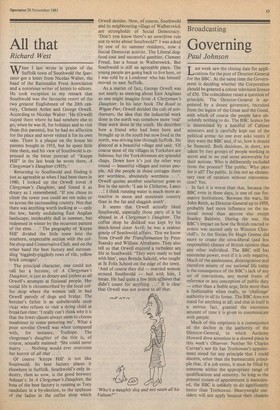All that
Richard West When I last wrote in praise of the Suffolk town of Southwold the Spectator got a letter from Nicolas Walter, the head of the Rationalist Press Association and a notorious writer of letters to editors. He took exception to my remark that Southwold was the favourite resort of the two greatest Englishmen of the 20th century, Clement Attlee and George Orwell. According to Nicolas Walter: 'He (Orwell) stayed there where he had nowhere else to go, when he was ill, for holidays and to visit them (his parents), but he had no affection for the place and never visited it for its own sake. There is a plaque on the house his parents bought in 1933, but he spent little time there, and his view of Southwold is expressed in the bitter portrait of "Knype Hill" in the last book he wrote there, A Clergyman's Daughter (1935).'
Returning to Southwold and finding it just as agreeable as when I had been there in 1980, I looked up the Orwell novel A Clergyman's Daughter, and found it as dreary as I remembered. 'If you chose to climb the tower you could see ten miles or so across the surrounding country. Not that there was anything worth looking at — only the low, barely undulating East Anglian landscape, intolerably dull in summer, but redeemed in winter by the recurrent pattern of the elms ... ' The geography of `Knype Hill' divided the little town into the southern, respectable section with the coffee shop and Conservative Club, and on the other hand the beet factory and surrounding 'higgledy-piggledy rows of vile, yellow brick cottages'.
The principal character, one could not call her a heroine, of A Clergyman's Daughter, is just as dreary and joyless as all Orwell's attempts at fictional people. Her social life is circumscribed by the local coffee shop where the women talk in bad Orwell parody of dogs and bridge. The heroine's father is an unbelievable snob vicar who refuses to visit a dying child at breakfast-time: 'I really can't think why it is that the lower classes always seem to choose mealtimes to come pestering me'. What a poor novelist Orwell was when compared with, for instance, Trollope. The clergyman's daughter of the title is, of course, sexually maimed: 'She could never marry. . .. Nothing would ever overcome her horror of all that .. .
Of course `Knype Hill' is not like Southwold. Its beet factory places it elsewhere in Suffolk. Southwold's only industry, then as now, is the good brewery Adnam's. In A Clergyman's Daughter, the boss of the beet factory is running as Tory candidate in a by-election, to the applause of the ladies in the coffee shop which Orwell derides. Now, of course, Southwold and its neighbouring village of Walberswick are strongholds of Social Democracy.
'Don't you know there's an unwritten rule not to write about Southwold?' I was asked by one of its summer residents, now a Social Democrat activist. The Liberal dogfood tout and successful gambler, Clement Freud, has a house in Walberswick. But Southwold is still an agreeable place. The young people are going back to live here, so I was told by a Londoner who has himself moved to east Suffolk.
As a matter of fact, George Orwell was not nearly as sneering about East Anglians as one might imagine from A Clergyman's Daughter. In his later book The Road to Wigan Pier, Orwell derided the cult of nor therners, the idea that the industrial work done in the north was somehow more 'real' than work done in the south. He describes how a friend who had been born and brought up in the south but now lived in the north, was driving him through Suffolk. He glanced at a beautiful village and said: 'Of course most of the villages in Yorkshire are hideous; but the Yorkshiremen are splendid chaps. Down here it's just the other way round — beautiful villages and rotten people. All the people in those cottages there are worthless, absolutely worthless ...
Orwell quotes another southerner gone to live in the north: 'I am in Clitheroe, Lancs . . : I think running water is much more attractive in moor and mountain country than in the fat and sluggish south'.
It seems that Orwell actually liked Southwold, especially those parts of it he abused in A Clergyman's Daughter. The coffee shop he disliked was kept by his much-loved sister Avril; he was a zealous gossip of Southwold affairs. This we know from Orwell the Transformation by Peter Stansky and William Abrahams. They also tell us that Orwell enjoyed a turbulent sex life in Southwold: 'They were ready to bed with him', says Brenda Salkeld, who taught at St Felix School on the edge of the town.
'And of course they did — married women around Southwold — bed with him, I mean. He had quite a few little affaires that didn't count for anything ... ' It is clear that Orwell was not averse to all that.














































 Previous page
Previous page